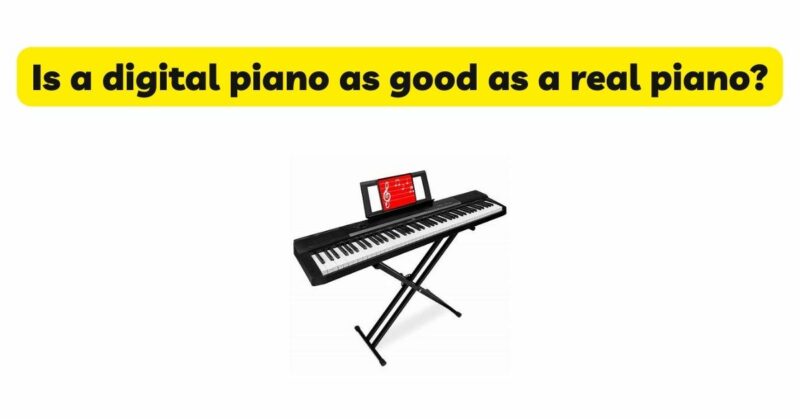In the world of music, the emergence of digital pianos has sparked debates about their ability to match the quality and experience of playing on a traditional acoustic piano. In this article, we will delve into the question of whether a digital piano can be considered as good as a real piano. By examining the key factors of sound quality, touch sensitivity, authenticity, versatility, practicality, and personal preference, we aim to provide insights that shed light on the unique characteristics and value of both digital and acoustic pianos.
- Sound Quality and Reproduction: When comparing digital pianos to acoustic pianos, sound quality is a significant consideration. Acoustic pianos produce sound acoustically through the vibration of strings and the resonance of the instrument’s body. This results in a rich, vibrant, and dynamic sound. Digital pianos, on the other hand, generate sound electronically by sampling or synthesizing piano tones. While digital pianos have made great strides in reproducing realistic piano sounds, some purists argue that they still fall short of capturing the full depth and complexity of an acoustic piano’s sound. However, high-quality digital pianos can provide a satisfying and enjoyable playing experience with their accurate piano tone reproduction.
- Touch Sensitivity and Key Action: The touch sensitivity and key action of a piano are essential elements in the player’s connection with the instrument. Acoustic pianos feature hammer-action keys that respond to the player’s touch, allowing for precise control over dynamics and expression. Digital pianos aim to replicate this touch sensitivity by incorporating weighted or graded hammer action keys. While digital pianos may not perfectly emulate the touch and feel of an acoustic piano, they have come remarkably close, providing a realistic and expressive playing experience. The advancement in key action technology has enabled digital pianos to offer a comparable level of touch sensitivity, allowing pianists to develop their technique and musicality effectively.
- Authenticity and Artistry: Authenticity is a subjective aspect that varies from person to person. While some pianists appreciate the timeless beauty and traditional craftsmanship of acoustic pianos, others find the versatility and convenience of digital pianos more appealing. It’s important to acknowledge that each instrument has its own unique character and charm. Acoustic pianos possess a rich history and are revered for their acoustic resonance, tonal complexities, and craftsmanship. Digital pianos, on the other hand, embrace technological advancements and offer a range of features that cater to modern musical needs. Both instruments can inspire creativity and artistry in their own distinct ways.
- Versatility and Sound Options: Digital pianos offer unparalleled versatility when it comes to sound options and features. They often include a wide range of instrument sounds beyond piano tones, including strings, organs, synthesizers, and more. This versatility allows musicians to explore various musical genres, experiment with different sounds, and even compose or arrange music using a single instrument. Acoustic pianos, on the other hand, excel in producing the authentic and unique sound of a piano. Their focused sound projection and resonance make them ideal for classical music and formal performances. The versatility of digital pianos provides an array of possibilities, while acoustic pianos offer a focused and traditional piano experience.
- Practicality and Maintenance: Digital pianos have practical advantages over acoustic pianos in terms of portability, maintenance, and cost. Digital pianos are generally more compact and lightweight, making them suitable for musicians with limited space or those who need to transport their instrument. Additionally, digital pianos do not require tuning, saving time and expenses associated with regular maintenance. On the other hand, acoustic pianos require periodic tuning and maintenance to keep them in optimal playing condition. Acoustic pianos are larger and heavier, making them less portable and requiring professional assistance for moving and installation. The practicality and low-maintenance nature of digital pianos make them a convenient choice for many pianists.
- Personal Preference and Artistic Goals: Ultimately, the choice between a digital piano and an acoustic piano depends on personal preference and artistic goals. Some musicians value the timeless beauty, authenticity, and acoustic qualities of an acoustic piano. They appreciate the tactile connection with the instrument and the traditional piano-playing experience. Others may prefer the versatility, technological integration, and convenience offered by digital pianos. It’s important for each individual to consider their specific musical goals, playing style, and preferences when making a decision.
Conclusion: The question of whether a digital piano is as good as a real piano does not have a straightforward answer. Both instruments have their own unique qualities, strengths, and purposes. Acoustic pianos offer the rich sound, resonance, and tactile experience that have captivated musicians for centuries. Digital pianos, on the other hand, embrace technological advancements and offer versatility, convenience, and integration capabilities that cater to the needs of modern musicians.
The choice between a digital piano and an acoustic piano depends on a variety of factors, including sound quality, touch sensitivity, authenticity, versatility, practicality, and personal preference. It’s important to consider one’s artistic goals, musical style, budget, space limitations, and maintenance requirements when deciding on the instrument that best aligns with individual needs and aspirations.
Rather than comparing digital pianos to acoustic pianos, it’s more productive to view them as complementary tools that can coexist in the musical landscape. Both instruments offer unique opportunities for musical expression, growth, and creativity. Embrace the instrument that resonates with your artistic vision and embark on a fulfilling journey of piano playing, whether it be with a digital piano or an acoustic piano.


